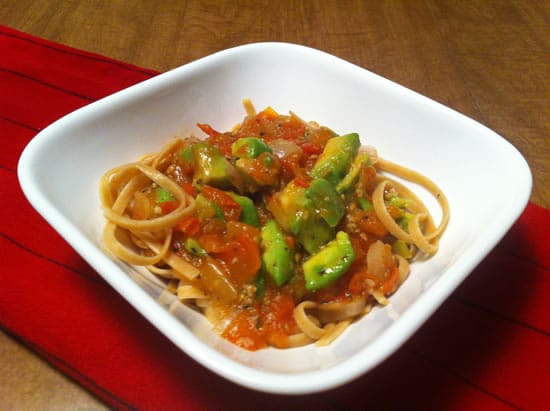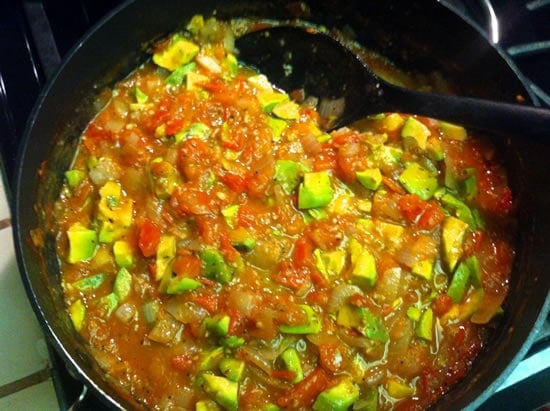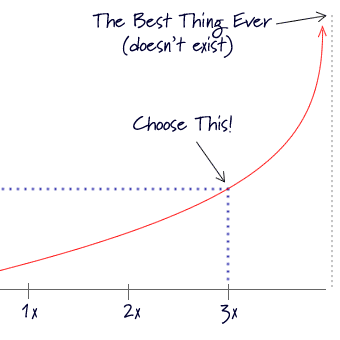Hunger in America (and Fettuccine with Tomato Avocado Sauce)
Last Updated September 7, 2017 · First Published April 8, 2013

Inspired by the new documentary film, A Place at the Table, fellow blogger Nicole Gulotta has asked hundreds of us to “donate” our posts today to help raise the issue of hunger and food insecurity in America, and I’m proud to join this chorus.
Of the more than seven billion people on this planet, nearly one billion are hungry. Yet we produce enough food right now to feed ten billion people. It’s clearly not a question of production; it’s issues of distribution, poverty, inequality, and policy.
As many as 50 million Americans are food insecure – including 1 in 5 children – and rely on the Supplemental Assistant Nutrition Program (formerly known as “food stamps”), which provides (only) about $3 or $4 of assistance each day to pay for food.
I believe that SNAP is a good and necessary program (even if I’ve been critical of parts of SNAP in the past), but it’s ultimately a band-aid. There are a few ways we can fix these inequalities, but it’s mostly going to come from political might and the stroke of a pen. Improving our economy, increasing wages, and reducing pay inequality is the place to start, of course. Beyond the obvious, though: We subsidize corn and soy beans to the tune of about $4 billion a year (most of the corn is used for animal feed and corn syrup) thus reducing the price of processed foods. Yet we subsidize fresh fruits and vegetables with about $825 million – and that includes all of them, not just one or two species.
Awareness of the problem is the first step, of course, and watching A Place at the Table is a good start. You can attend a screening, or watch it on iTunes or Amazon.
Then please let Congress know that SNAP is a critical program that should not be cut or reduced.
I’d also like to highlight another benefit of the SNAP program that most people aren’t aware of: SNAP benefits can be used to purchase food-producing plants! So if you’re receiving SNAP assistance I encourage you to consider using your benefits to help you grow some of your own food.
Additionally, EBT (Electronics Benefits Transfer) cards are now being accepted at many farmers markets. Even better, some markets also offer a “bonus” credit for purchases made using SNAP. I know of one market in Long Beach, CA, for example, that basically doubles the benefits through a matching program. So $5 worth of EBT credit becomes $10 worth of fresh farmers market produce. How great is that? So talk to your farmers market manager, and make sure they accept EBT cards (if they don’t, send them to this page!)
Nicole also suggested we share a budget-friendly recipe in our posts, and I immediately thought of this Fettucine with Tomato Avocado Sauce. I discovered this recipe twenty-ish years ago in John Robbins’ powerful Diet for a New America (which was just recently updated to a second edition!), and I’ve always loved it as an easy and unique dish, with a high “bang for your buck” ratio. I haven’t actually looked at his version of the recipe in many years, since I just make it from memory now – so I’m calling this one “adapted” as I’m sure it’s drifted a bit from the original (I also use whole wheat pasta now, of course!). It’s definitely a crowd-pleaser, and leftovers keep pretty well in the fridge, too. Enjoy!

Fettuccine with Tomato Avocado Sauce
Ingredients
- 1 pound Whole Wheat Fettuccine or Linguine
- 2 Tablespoons Olive Oil
- 1 large onion, diced
- 1 1/2 pounds tomatoes, diced (peeling is optional)
- 4 to 8 cloves garlic, finely chopped or pressed
- 1/2 cup wine or pasta water, optional
- 1/2 teaspoon salt
- 1/2 teaspoon black pepper
- 1/2 to 1 teaspoon red chili flakes, more or less to your spiciness preference
- 3-4 leaves fresh basil, thinly sliced, or 1/2 teaspoon dried basil
- 2-3 ripe avocados, peeled and cut into approx. 1/2" cubes
Instructions
- Cook the pasta according to the package directions. (If you start cooking the sauce at the same time as you start boiling your pot of water, they'll both finish around the same time.)
- In a large saucepan over medium heat, add the olive oil, and diced onion. Saute until the onion is translucent, about 8 minutes.
- Add the diced tomatoes and continue to simmer, stirring occasionally. Around this time, add the garlic too.
- After about 5-10 minutes, the tomatoes will begin breaking down and releasing their juice. Continue simmering and stirring as the mixture becomes runnier - as the liquid condenses the sauce will get a bit thicker. Optionally add the wine or pasta water. Continue simmering until it reaches the desired consistency.
- Add the salt, pepper, chili flakes, and basil and adjust to taste.
- Just before you're about to serve dinner, turn off the heat and gently stir in the avocado. The idea is for the sauce to warm the avocado, but not let it get too mushy.
- Portion out some pasta, ladle some sauce on top, and dig in!
Nutrition
More tips for eating well on a tight budget:






















It’s a broken system, with many downfalls, that’s for sure. I truly believe that if a person must live on most of what (packaged, processed foods) is offered in food pantries, they will not be healthy in the long run. Our local gardening group brings in extra produce to the food pantries. It is always quickly snatched up… but try to start a community garden here near the subsidized housing and there is no interest. On another note, my husband was in the Walmart yesterday and the person in front of him had a cart load of fish aquarium supplies and some fish… and a gallon of milk. Then she pulled out a snap card to pay for it. The cashier told her that she didn’t think it would go through. The lady told her to go ahead and try… sometimes it doesn’t catch it. She ended up having to… Read more »
Very simply, we subsidize high-fructose corn syrup in this country, but not carrots. While the surgeon general is raising alarms over the epidemic of obesity, the president is signing farm bills designed to keep the river of cheap corn flowing, guaranteeing that the cheapest calories in the supermarket will continue to be the unhealthiest.”
Great post! Here in DC we’ve got at least 10 markets that double the EBT’s, not every market but we’re getting there. Hopefully it’ll be more accessible to others throughout the country sooner rather than later!
Making farmer’s markets more accessible by matching EBT dollars is fantastic! My family has often been helped by assistance programs, as our employment situation has been up & down over the years. One woman said, “It’s exhausting,” and that’s how I feel. It takes a lot of time to stand in line at the food bank, only to get a few items, & then arrange to get to another location to get a few more items. Then to have to go home & prepare the food from scratch takes more time. Add to that the fact that if you have food sensitivities, or just want to eat healthy foods, there may not be much offered that you can actually eat. I’m really thankful to the food banks that are making improvements! Also, thanks to all of you who are bring this issue to the forefront.
Thanks for the great post. And on a purely selfish note, I was casting around for a dinner idea, and this is it.
Yay! I just realized I forgot to include garlic in the recipe — so I just added it in.
Let us know how it turns out!
it’s great to know that more farmers markets are accepting EBT. what drives me nuts is how nokidhungry and feeding america are strongly sponsored by conagra, kraft, etc. everyone deserves nutritious, ethical and honest food.
I agree. Last year I was invited to sit on a “blog council” for Feeding America. I did a little homework on the organization and their funding sources, and quickly realized I couldn’t in good consience work with them. The worst example I found was a cross-promotion they did with the Cheesecake Factory: If you bought a slice of Oreo Cookie Cheesecake — one of their most caloric desserts — they’d donate a quarter to Feeding America. Good grief.
Oh boy do I love avocados! This looks beautiful 🙂 Thank you so much for posting today!
Thank you so much for taking part in this event today!
Absolutely! And thank you for organizing it! 🙂
I watched a similar documentary a few months ago, on television. It focused on the children in each struggling family and it was absolutely heartbreaking. The children in the documentary were most obviously stressed beyond their capabilities, with adult concerns about affordability, living arrangements, etc. I was truly affected by the production as I am sure I will be by this film. Thank you so much for sharing this, bringing it once again to our attention and getting the word out about this issue and the film.
http://video.pbs.org/video/2306814133 Here is the link to the program I am referring to above: Poor Kids. If you only watch the first 90 seconds, you will be moved.